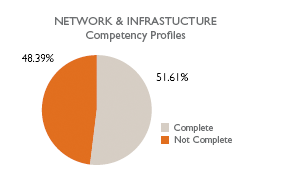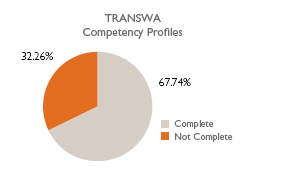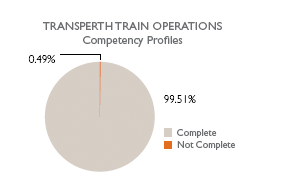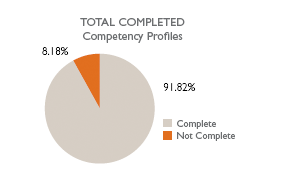Workforce Planning
A number of strategies were developed in the PTA’s “Building Capability: Workforce Planning Strategy Report V2 - 2006 to 2008” to continue to address the challenges of succession management, attraction, recruitment retention and development and these strategies are progressively being implemented. The key issues identified through the collection of qualitative and quantitative data that require attention include:
- Training opportunities including an emphasis on leadership training and future management of a multigenerational workforce;
- Offer and promote development opportunities including career paths especially in operational areas;
- Succession management to address forecasts of senior management skills shortages through the implementation of the Accelerated Leadership Development Program;
- Knowledge transfer to facilitate the sharing of skills, knowledge and experience. 50 mentoring partnerships were established, with active participation and support from the Executive Team;
- Offer flexible work practice options to promote work/life quality to increase workforce participation in diversity groups; and
- Phased Retirement options as a retention strategy for managing our mature age workforce.
Performance and Development Plans
The Performance and Development Plan (PDP) process ensures a link between the strategic and operational plans, and the key tasks and projects being carried out by individuals. A revised process for salaried staff and new format for wages employees resulted in a marked increase in the PDP usage rate during the year. Training in the PDP process and performance management was delivered on-line, utilising flexible, self-paced courses.
Leadership Training
The fourth intake of supervisors and managers commenced Front Line Management training in 2006/07. The training includes work-based projects relating to operational issues. Participants receive a Certificate IV in Business (Frontline Management), on completion, ensuring that PTA managers hold nationally-recognised qualifications.
To address forecasts of senior management skills shortages, the PTA implemented a robust succession management process with the establishment of the Accelerated Leadership Development Program. A pool of 66 potential successors was identified and these people each completed a 360 feedback process based on the State Government’s Leadership Capability Profile. Development was planned based on individual results in conjunction with managers. Participants were also provided with a workplace mentor to facilitate the sharing of skills, knowledge and experience. Fifty mentoring partnerships were established, with active participation and support from the Executive Team.
Developing a Learning Organisation
The PTA continued to coordinate employee access to a wide range of professional development courses. It also continued its Study Assistance Policy which provides significant support with fees and paid time off for employees to pursue both undergraduate and postgraduate qualifications. The policy includes provision for a Chief Executive Scholarship fund of $20,000 per annum, and one scholarship was awarded in 2006/07.
Employee Engagement
In response to the views of employees expressed in an organisation-wide opinion poll in June 2006, the PTA adopted a large program of initiatives and improvements. The views of salaried and wages employees differed somewhat, which is reflected in the program.
These initiatives and improvements relate to:
| Salaried employees | Wages employees |
|---|---|
Fair and impartial selection process | Opportunities to learn and develop |
Cross-divisional teamwork | Involvement in decisions |
Performance management | Acknowledgement for suggestions |
Training | Freedom from discrimination and harassment |
Work/life balance |
Two important employee engagement projects were conducted during the year specifically among the 263 urban railcar drivers – the PTA’s largest individual work group. The projects were intended to improve leadership and inter-personal communications.
A review of the communications climate was conducted during April and May. The purpose of the review was to determine if any improvement in driver engagement had resulted from a raft of communications initiatives during the previous 18 months. The external consultant who conducted the review reported marked improvements in communications throughout the work group. The overall tone of discussions with drivers was positive. The level of positive engagement between drivers and the organisation had risen significantly, and there was a noticeably higher level of mutual trust and respect.
The second project was an employee opinion poll among the railcar drivers. A total of 145 drivers participated, and 61% said they were satisfied with their job and 59% said they were positively motivated in their work.
The results of both projects are being used to formulate a plan of additional actions to further improve the engagement of drivers.
PTA people are encouraged to participate
in charity-related activities on behalf of the
organisation. During the year, about 150 staff
participated in the Asthma Foundation Bike Hike,
Radio Lollipop, Clean up Australia Day,
![]() RSPCA
Million Paws Walk, Activ Foundation City to Surf,
RSPCA
Million Paws Walk, Activ Foundation City to Surf,
![]() Red
Cross Blood Drive and the Salvation Army Christmas
Appeal.
Red
Cross Blood Drive and the Salvation Army Christmas
Appeal.
Healthy Living
The PTA continued to provide access to professionally-delivered fitness assessment and training for employees through its Health and Lifestyle Program. This program was complemented with health promotion information and activity programs such as gym circuits and pilates. There was a 37% increase from previous programs in staff participation in the pathology and lifestyle assessment testing in 2007.
The health promotion program “Cycling 100” was initiated for employees at Claisebrook and Nowergup depots. The program is designed to establish healthy behavioural patterns through a commitment to a minimum of six months of cycling. The PTA version of “Cycling 100” is based on a pilot project run by Department of Environment and modified to account for the shift patterns at the two depots.
There was an overwhelming response to the initiative. More than 160 participants signed up to complete the 60 kilometres per week for the duration of the program. Participants undergo a cardiovascular risk assessment and fitness test at the start and end of the program to measure their progress. By the end of the program, it is expected that the participants will have experienced significant physiological and psychological benefits while collectively travelling over 200,000km on their bikes.
Competency-Based Training
The PTA is a Registered Training Organisation (RTO) whose purpose is to provide quality training and assessment services for the PTA in compliance with the Australian Quality Training Framework and established best practice guidelines. The PTA RTO is scoped to issue Certificates II and III in Transport and Distribution (Rail Operations) from the TDT02 Transport and Distribution Training Package.
A number of initiatives were undertaken by the RTO in 2006/07. These included:
- Managing the $1.5 million training contract for Transperth Train Operations
- Delivering and administering re-qualification training for a number of operational areas
- Coordinating the Business Traineeship program and the Apprenticeship program
- Implementing and managing the Janison database to facilitate the centralisation of training records across the organisation
- Launching PTA On-line in June 2006 to provide online learning opportunities for all staff
- Developing competency profiles for 92% of all wages employees in the illustrated divisions




In 2006/07, the RTO team coordinated, developed, delivered and reviewed competency-based and enterprise specific training and assessment programs for the following:
- Transit Officer training (new employees and requalification)
- Urban Railcar Driver training (new employees and re-qualification)
- Urban Railcar Driver Recognition of Prior Learning
- Customer Service Assistants training
- Passenger Ticketing Assistants training
- Train Control Recognition of Prior Learning
- Car Park Attendants training
- Control Monitoring Room Operators training
- PTA Radio Procedures training
- Emergency Management Manual awareness
- Oleoresin capsicum spray training
- Counter-terrorism training
- SmartRider refresher training
- Revenue Protection training for CHUBB guards
- Authorised persons training for Transperth Bus security contractors
Training Summary
| Competency-Based Training 2006/07 | PTA Staff | Contract Staff |
|---|---|---|
Number of Courses Delivered | 49 | 8 |
Number of People Trained | 481 | 96 |
Total Training Days | 818 | 20 |



